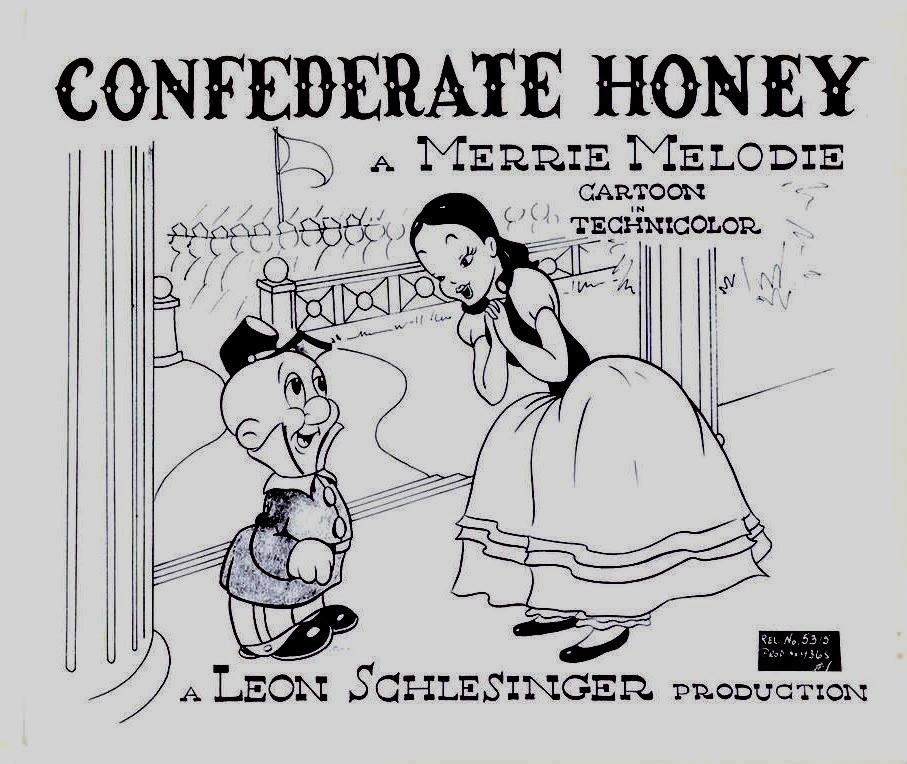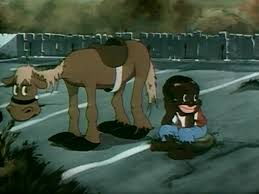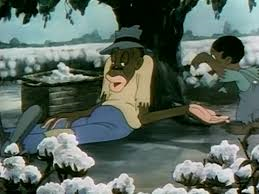Difference between revisions of "Confederate Honey"
(Created page with "260px|thumb <b>Confederate Honey</b> is a 1940 Merrie Melodies cartoon directed by Friz Freleng. This short released in USA March 30, 1940. This cartoon is...") |
m |
||
| Line 4: | Line 4: | ||
[[File:Confederate Honey 5.png|thumb]] | [[File:Confederate Honey 5.png|thumb]] | ||
==Plot== | ==Plot== | ||
| − | It's 1862, and a southern belle | + | It's 1862, and Crimson, a southern belle, has her heart set on Ned Cutler (Elmer Fudd), a Confederate soldier who wants to marry her. Unfortunately, the Civil War breaks out before Cutler can propose, and the soldier is forced to fight. Meanwhile, Crimson waits for Cutler to return by hanging a lantern outside her window. |
| − | + | Colonel O'Hairoil, a literal blueblood in Kentucky's literally bluegrass country, presides over rich tobacco and cotton plantations in 1861 (B.Sea., which stands for "Before Seabiscuit"). His black workers pick the cotton one boll at a time, and when one young lad hands his recumbent father two bolls of cotton to place in the packing crate, he is warned, "Don't get too ambitious there, son." | |
| − | + | Crimson O'Hairoil, the Colonel's daughter, is the pride of the plantation, and she is courted by many suitors who leave in vain after having their horse parking ticket validated (for parking is charged by the hour). Crimson is only interested in Ned Cutler, the "chivalrous, hard-riding, square-shooting soldier of fortune" (From Elmer Fudd). Ned arrives and is about to ask Crimson a question when an explosion occurs. The Civil War in the United States of America has begun. Ned has to depart in order to join his "wegiment." Despite the attendant's warning, he parks his horse in the paid lot. | |
Meanwhile, the horse and attendant await Ned's return. The Colonel is dispirited to hear, on the radio, that "The Yanks" have won again, announced before a victory for Brooklyn (and all others rained out), and curses the Yankees. | Meanwhile, the horse and attendant await Ned's return. The Colonel is dispirited to hear, on the radio, that "The Yanks" have won again, announced before a victory for Brooklyn (and all others rained out), and curses the Yankees. | ||
| − | Back at camp, Ned reads a letter and sighs. A signal rocket turns into an advertisement "After the battle eat Southern Fried Chicken at Mammy's Shack." Crimson, | + | Back at camp, Ned reads a letter and sighs. A signal rocket turns into an advertisement "After the battle eat Southern Fried Chicken at Mammy's Shack." Crimson, promised to burn a light in the window for Ned, does so with such enthusiasm with a searchlight that she alarms Paul Revere, who rides away giving his famous warning. |
| − | + | Between 1861 and 1865, the war ends (with the horse and attendant still in the lot). Ned returns to Crimson, who has been patiently awaiting his arrival. Ned appears to be ready to propose, but all he wants is for her to validate his parking ticket. She responds by stamping a "Revoked" on his forehead, causing his head to reverberate like a gong. | |
This is the first of three cartoons featuring the black hunter from All This and Rabbit Stew. He appears as the slave who is waiting for Ned to pick up his horse. | This is the first of three cartoons featuring the black hunter from All This and Rabbit Stew. He appears as the slave who is waiting for Ned to pick up his horse. | ||
| Line 20: | Line 20: | ||
[[File:Confederate Honey 4.png|thumb]] | [[File:Confederate Honey 4.png|thumb]] | ||
==The Controversy== | ==The Controversy== | ||
| − | Confederate Honey was not among the studio’s notorious [[Censored Eleven]] cartoons that were banned from syndication due to racially insensitive content, but at the same time it was never a prominent part of the rerun culture. It was | + | Confederate Honey was not among the studio’s notorious [[Censored Eleven]] cartoons that were banned from syndication due to racially insensitive content, but at the same time it was never a prominent part of the rerun culture.It was included in a LaserDisc release in the 1990s that depicted the evolution of the Egghead character into Elmer Fudd, and a censored version that cut out or cropped scenes with the slave characters was included as a special feature on a 2005 DVD of Errol Flynn's Western "Virginia City."<ref>Phil Hall, January 4, 2019. [http://cinema-crazed.com/blog/2019/01/04/the-bootleg-files-confederate-honey/ The Bootleg Files: Confederate Honey], cinema-crazed.com. Retrieved December 21, 2020</ref> |
All the slaves in this cartoon drawn in black skin, exaggerate big lips, extreme lethargic, and half-closed sleepy eyes. All this characteristic features refer to black ethnic stereotype. | All the slaves in this cartoon drawn in black skin, exaggerate big lips, extreme lethargic, and half-closed sleepy eyes. All this characteristic features refer to black ethnic stereotype. | ||
==Trivia== | ==Trivia== | ||
| − | The film is a parody of "Gone with the Wind" (1939), but | + | The film is a parody of "Gone with the Wind" (1939), but it takes place in Kentucky rather than Georgia. During the American Civil War, it depicts Kentucky joining the Confederate States of America. Despite the fact that Kentucky was a Union state during the war, Kentucky soldiers served on both sides. A total of 125,000 Kentuckians served as Union soldiers, with another 35,000 serving as Confederate soldiers.<ref>[https://www.imdb.com/title/tt0032352/trivia?ref_=tt_trv_trv IMDb Trivia]. Retrieved December 21, 2020</ref> |
==External Link== | ==External Link== | ||
Revision as of 14:48, 11 March 2021
Confederate Honey is a 1940 Merrie Melodies cartoon directed by Friz Freleng. This short released in USA March 30, 1940. This cartoon is a parody of Gone With the Wind (1939).[1]
Plot
It's 1862, and Crimson, a southern belle, has her heart set on Ned Cutler (Elmer Fudd), a Confederate soldier who wants to marry her. Unfortunately, the Civil War breaks out before Cutler can propose, and the soldier is forced to fight. Meanwhile, Crimson waits for Cutler to return by hanging a lantern outside her window.
Colonel O'Hairoil, a literal blueblood in Kentucky's literally bluegrass country, presides over rich tobacco and cotton plantations in 1861 (B.Sea., which stands for "Before Seabiscuit"). His black workers pick the cotton one boll at a time, and when one young lad hands his recumbent father two bolls of cotton to place in the packing crate, he is warned, "Don't get too ambitious there, son."
Crimson O'Hairoil, the Colonel's daughter, is the pride of the plantation, and she is courted by many suitors who leave in vain after having their horse parking ticket validated (for parking is charged by the hour). Crimson is only interested in Ned Cutler, the "chivalrous, hard-riding, square-shooting soldier of fortune" (From Elmer Fudd). Ned arrives and is about to ask Crimson a question when an explosion occurs. The Civil War in the United States of America has begun. Ned has to depart in order to join his "wegiment." Despite the attendant's warning, he parks his horse in the paid lot.
Meanwhile, the horse and attendant await Ned's return. The Colonel is dispirited to hear, on the radio, that "The Yanks" have won again, announced before a victory for Brooklyn (and all others rained out), and curses the Yankees.
Back at camp, Ned reads a letter and sighs. A signal rocket turns into an advertisement "After the battle eat Southern Fried Chicken at Mammy's Shack." Crimson, promised to burn a light in the window for Ned, does so with such enthusiasm with a searchlight that she alarms Paul Revere, who rides away giving his famous warning.
Between 1861 and 1865, the war ends (with the horse and attendant still in the lot). Ned returns to Crimson, who has been patiently awaiting his arrival. Ned appears to be ready to propose, but all he wants is for her to validate his parking ticket. She responds by stamping a "Revoked" on his forehead, causing his head to reverberate like a gong.
This is the first of three cartoons featuring the black hunter from All This and Rabbit Stew. He appears as the slave who is waiting for Ned to pick up his horse.
The Controversy
Confederate Honey was not among the studio’s notorious Censored Eleven cartoons that were banned from syndication due to racially insensitive content, but at the same time it was never a prominent part of the rerun culture.It was included in a LaserDisc release in the 1990s that depicted the evolution of the Egghead character into Elmer Fudd, and a censored version that cut out or cropped scenes with the slave characters was included as a special feature on a 2005 DVD of Errol Flynn's Western "Virginia City."[2]
All the slaves in this cartoon drawn in black skin, exaggerate big lips, extreme lethargic, and half-closed sleepy eyes. All this characteristic features refer to black ethnic stereotype.
Trivia
The film is a parody of "Gone with the Wind" (1939), but it takes place in Kentucky rather than Georgia. During the American Civil War, it depicts Kentucky joining the Confederate States of America. Despite the fact that Kentucky was a Union state during the war, Kentucky soldiers served on both sides. A total of 125,000 Kentuckians served as Union soldiers, with another 35,000 serving as Confederate soldiers.[3]
External Link
Watch Confederate Honey at Dailymotion
Confederate Honey at IMDb
References
- ↑ Confederate Honey. Retrieved December 21, 2020.
- ↑ Phil Hall, January 4, 2019. The Bootleg Files: Confederate Honey, cinema-crazed.com. Retrieved December 21, 2020
- ↑ IMDb Trivia. Retrieved December 21, 2020


